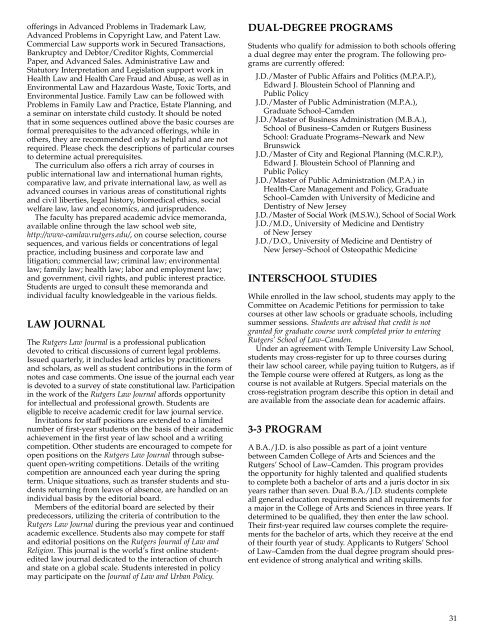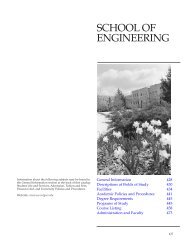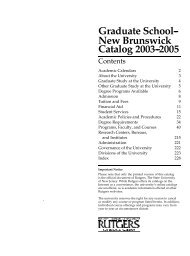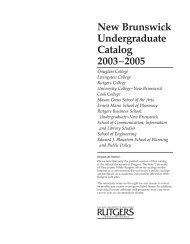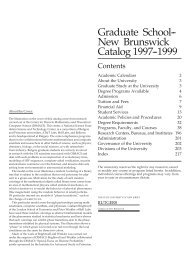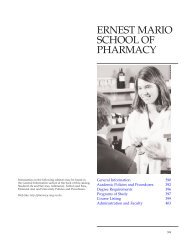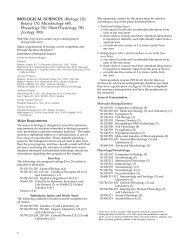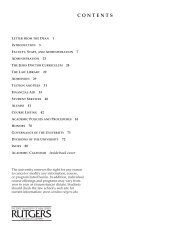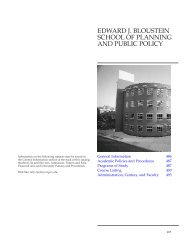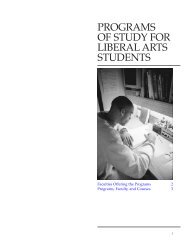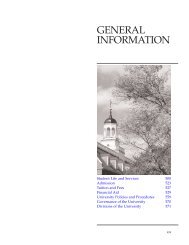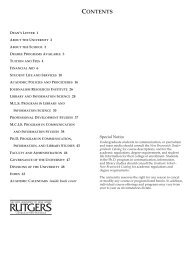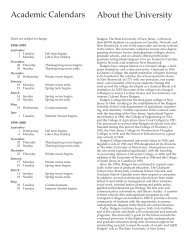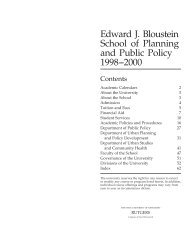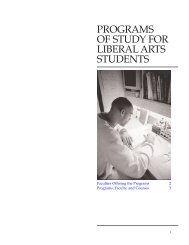Rutgers University School of Law-Camden - Catalogs - Rutgers, The ...
Rutgers University School of Law-Camden - Catalogs - Rutgers, The ...
Rutgers University School of Law-Camden - Catalogs - Rutgers, The ...
Create successful ePaper yourself
Turn your PDF publications into a flip-book with our unique Google optimized e-Paper software.
<strong>of</strong>ferings in Advanced Problems in Trademark <strong>Law</strong>,<br />
Advanced Problems in Copyright <strong>Law</strong>, and Patent <strong>Law</strong>.<br />
Commercial <strong>Law</strong> supports work in Secured Transactions,<br />
Bankruptcy and Debtor/Creditor Rights, Commercial<br />
Paper, and Advanced Sales. Administrative <strong>Law</strong> and<br />
Statutory Interpretation and Legislation support work in<br />
Health <strong>Law</strong> and Health Care Fraud and Abuse, as well as in<br />
Environmental <strong>Law</strong> and Hazardous Waste, Toxic Torts, and<br />
Environmental Justice. Family <strong>Law</strong> can be followed with<br />
Problems in Family <strong>Law</strong> and Practice, Estate Planning, and<br />
a seminar on interstate child custody. It should be noted<br />
that in some sequences outlined above the basic courses are<br />
formal prerequisites to the advanced <strong>of</strong>ferings, while in<br />
others, they are recommended only as helpful and are not<br />
required. Please check the descriptions <strong>of</strong> particular courses<br />
to determine actual prerequisites.<br />
<strong>The</strong> curriculum also <strong>of</strong>fers a rich array <strong>of</strong> courses in<br />
public international law and international human rights,<br />
comparative law, and private international law, as well as<br />
advanced courses in various areas <strong>of</strong> constitutional rights<br />
and civil liberties, legal history, biomedical ethics, social<br />
welfare law, law and economics, and jurisprudence.<br />
<strong>The</strong> faculty has prepared academic advice memoranda,<br />
available online through the law school web site,<br />
http://www-camlaw.rutgers.edu/, on course selection, course<br />
sequences, and various fields or concentrations <strong>of</strong> legal<br />
practice, including business and corporate law and<br />
litigation; commercial law; criminal law; environmental<br />
law; family law; health law; labor and employment law;<br />
and government, civil rights, and public interest practice.<br />
Students are urged to consult these memoranda and<br />
individual faculty knowledgeable in the various fields.<br />
LAW JOURNAL<br />
<strong>The</strong> <strong>Rutgers</strong> <strong>Law</strong> Journal is a pr<strong>of</strong>essional publication<br />
devoted to critical discussions <strong>of</strong> current legal problems.<br />
Issued quarterly, it includes lead articles by practitioners<br />
and scholars, as well as student contributions in the form <strong>of</strong><br />
notes and case comments. One issue <strong>of</strong> the journal each year<br />
is devoted to a survey <strong>of</strong> state constitutional law. Participation<br />
in the work <strong>of</strong> the <strong>Rutgers</strong> <strong>Law</strong> Journal affords opportunity<br />
for intellectual and pr<strong>of</strong>essional growth. Students are<br />
eligible to receive academic credit for law journal service.<br />
Invitations for staff positions are extended to a limited<br />
number <strong>of</strong> first-year students on the basis <strong>of</strong> their academic<br />
achievement in the first year <strong>of</strong> law school and a writing<br />
competition. Other students are encouraged to compete for<br />
open positions on the <strong>Rutgers</strong> <strong>Law</strong> Journal through subsequent<br />
open-writing competitions. Details <strong>of</strong> the writing<br />
competition are announced each year during the spring<br />
term. Unique situations, such as transfer students and students<br />
returning from leaves <strong>of</strong> absence, are handled on an<br />
individual basis by the editorial board.<br />
Members <strong>of</strong> the editorial board are selected by their<br />
predecessors, utilizing the criteria <strong>of</strong> contribution to the<br />
<strong>Rutgers</strong> <strong>Law</strong> Journal during the previous year and continued<br />
academic excellence. Students also may compete for staff<br />
and editorial positions on the <strong>Rutgers</strong> Journal <strong>of</strong> <strong>Law</strong> and<br />
Religion. This journal is the world’s first online studentedited<br />
law journal dedicated to the interaction <strong>of</strong> church<br />
and state on a global scale. Students interested in policy<br />
may participate on the Journal <strong>of</strong> <strong>Law</strong> and Urban Policy.<br />
DUAL-DEGREE PROGRAMS<br />
Students who qualify for admission to both schools <strong>of</strong>fering<br />
a dual degree may enter the program. <strong>The</strong> following programs<br />
are currently <strong>of</strong>fered:<br />
J.D./Master <strong>of</strong> Public Affairs and Politics (M.P.A.P.),<br />
Edward J. Bloustein <strong>School</strong> <strong>of</strong> Planning and<br />
Public Policy<br />
J.D./Master <strong>of</strong> Public Administration (M.P.A.),<br />
Graduate <strong>School</strong>–<strong>Camden</strong><br />
J.D./Master <strong>of</strong> Business Administration (M.B.A.),<br />
<strong>School</strong> <strong>of</strong> Business–<strong>Camden</strong> or <strong>Rutgers</strong> Business<br />
<strong>School</strong>: Graduate Programs–Newark and New<br />
Brunswick<br />
J.D./Master <strong>of</strong> City and Regional Planning (M.C.R.P.),<br />
Edward J. Bloustein <strong>School</strong> <strong>of</strong> Planning and<br />
Public Policy<br />
J.D./Master <strong>of</strong> Public Administration (M.P.A.) in<br />
Health-Care Management and Policy, Graduate<br />
<strong>School</strong>–<strong>Camden</strong> with <strong>University</strong> <strong>of</strong> Medicine and<br />
Dentistry <strong>of</strong> New Jersey<br />
J.D./Master <strong>of</strong> Social Work (M.S.W.), <strong>School</strong> <strong>of</strong> Social Work<br />
J.D./M.D., <strong>University</strong> <strong>of</strong> Medicine and Dentistry<br />
<strong>of</strong> New Jersey<br />
J.D./D.O., <strong>University</strong> <strong>of</strong> Medicine and Dentistry <strong>of</strong><br />
New Jersey–<strong>School</strong> <strong>of</strong> Osteopathic Medicine<br />
INTERSCHOOL STUDIES<br />
While enrolled in the law school, students may apply to the<br />
Committee on Academic Petitions for permission to take<br />
courses at other law schools or graduate schools, including<br />
summer sessions. Students are advised that credit is not<br />
granted for graduate course work completed prior to entering<br />
<strong>Rutgers</strong>’ <strong>School</strong> <strong>of</strong> <strong>Law</strong>–<strong>Camden</strong>.<br />
Under an agreement with Temple <strong>University</strong> <strong>Law</strong> <strong>School</strong>,<br />
students may cross-register for up to three courses during<br />
their law school career, while paying tuition to <strong>Rutgers</strong>, as if<br />
the Temple course were <strong>of</strong>fered at <strong>Rutgers</strong>, as long as the<br />
course is not available at <strong>Rutgers</strong>. Special materials on the<br />
cross-registration program describe this option in detail and<br />
are available from the associate dean for academic affairs.<br />
3-3 PROGRAM<br />
A B.A./J.D. is also possible as part <strong>of</strong> a joint venture<br />
between <strong>Camden</strong> College <strong>of</strong> Arts and Sciences and the<br />
<strong>Rutgers</strong>’ <strong>School</strong> <strong>of</strong> <strong>Law</strong>–<strong>Camden</strong>. This program provides<br />
the opportunity for highly talented and qualified students<br />
to complete both a bachelor <strong>of</strong> arts and a juris doctor in six<br />
years rather than seven. Dual B.A./J.D. students complete<br />
all general education requirements and all requirements for<br />
a major in the College <strong>of</strong> Arts and Sciences in three years. If<br />
determined to be qualified, they then enter the law school.<br />
<strong>The</strong>ir first-year required law courses complete the requirements<br />
for the bachelor <strong>of</strong> arts, which they receive at the end<br />
<strong>of</strong> their fourth year <strong>of</strong> study. Applicants to <strong>Rutgers</strong>’ <strong>School</strong><br />
<strong>of</strong> <strong>Law</strong>–<strong>Camden</strong> from the dual degree program should present<br />
evidence <strong>of</strong> strong analytical and writing skills.<br />
31


